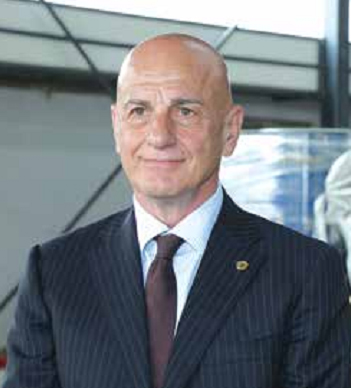In the year of entrepreneurship, company Miteco marks 50 years since the establishment of the first purchasing station for secondary raw materials in Rakovica, and the opening of a new recycling facility for hazardous industrial waste, which should contribute to meeting the European environmental standards to which Serbia has committed itself to achieving
Industrial waste is a new, growing branch of industry that creates jobs and contributes to a healthier future and should be given institutional support in efforts to overcome the unfair competition of black and grey markets, as well as greater investment from the Green Fund, says Miodrag Mitrović, president of Miteco.
Miteco has presented its new recycling complex in Rakovica, in which it invested 2.3 million euros. What does this complex encompasse and what will be treated there?
— This is a unique complex for the integrated management of azardous industrial waste. It is comprised of a transfer station for chemicals that cannot be treated in Serbia and are exported for incineration abroad, then a facility for the recycling of large electric power devices over 1000V and the decontamination of equipment containing PCBs, as well as a mobile plant for the remediation of locations contaminated with PCBs, where exploitation operations and the maintenance of machines has led to leakages of oil and the pollution of land and water.
In which way will this recycling complex and plant for recycling contribute to the advancement of the waste management system in Belgrade and in Serbia as a whole?
— The Waste Management Plan of Belgrade envisages that at least two stations are necessary that would sanitise hazardous waste from the territory of the city. Likewise, the National Programme noted that in the forthcoming period it is necessary to take measures for the removal of POPs chemicals (long-term pollutants), and above all PCB chemicals, which is one of the most toxic (causing mutagenicity and carcinogenicity). These chemicals represent historical pollution and Serbia, as an EU candidate country, is obliged to rehabilitate and remove them. This complex contributes to preparing the ground for the arrival of foreign investors, simply by allowing the remediation of historical contamination or the disposal of historical waste from locations where investments are planned.
According to the National Waste Management Strategy, in Serbia there are 100,000 tonnes of existing historical pollution. In which period could this contamination be rehabilitated?
— Removing historical pollution in companies undergoing restructuring and in bankruptcy is the state’s obligation. Considering the fact that in 2015 around 3,000 tonnes was dealt with, if work continues at this pace it will reqire a long as 30 years to complete the job. This is unsustainable and therefore I believe that the Serbian government has to allocate five times as much money for these purposes from the Green Fund. According to data for the last year, that amount was around 2.5 million euros, so in the next five to six years much more should be allocated.
To what extent can the entry of private capital in the utilities sector contribute to our country developing in the field of recycling?
— The recycling industry in Serbia is underdeveloped, so we only use 10% of the total amount of generated waste for recycling, while the rest is dumped at landfill sites. Thus, waste, which is a raw material, is discarded and left to future generations to pay dearly for that. The government, for example, used subsidies to support the development of EE recycling and now we have enough plants for the treatment of this type of waste. However, the EU does not recognise this form of subsidy, so investors are needed, the arrival of which reqires a legislative framework that will clearly define the stability of the business. That’s why I expect that the competent ministry in the new government to take measures to create conditions for the removal of unfair competition from black and grey markets. This also represents a chance for GDP growth with the use of private capital.
In September the ISWA World Congress will be held in Novi Sad. How important is this event for Serbia?
— The staging of the ISWA congress in our country is a good opportunity for the media and the general public to be familiarised with global trends in the field of waste management and sustainable development. We believe that the use of solid waste for energy purposes is one of the possibilities of its use, and new technology emerges every day, which is also a big chance for Serbia. At the congress we will contribute with our experience and, together with international experts and organisations, attempt to reach a proposal to further improve the system of waste management in Serbia.
In the year of entrepreneurship, the company Miteco marks 50 years since the establishment of the first purchasing station for secondary raw materials in Rakovica, the foundations of which you have built upon. In which direction will the further development of the company head?
— We restored the complex after privatisation and gave an example of how brownfield investment, without changing the basic activities and through the introduction of new techniques, can operate successfully. We are now focused on investing in new technologies for the reuse of materials and energy use of waste, for example, in the production of alternative fuels. Together with our partners from the EU, we will invest in a plant for the incineration of medical waste, because Belgrade is a major medical centre where a large amount of such waste is generated. Serbian industry needs support from the private sector, entrepreneurs who innovate and support ethical recepts.

